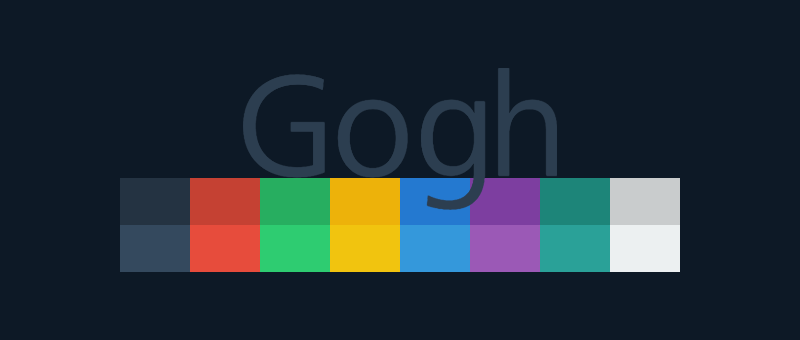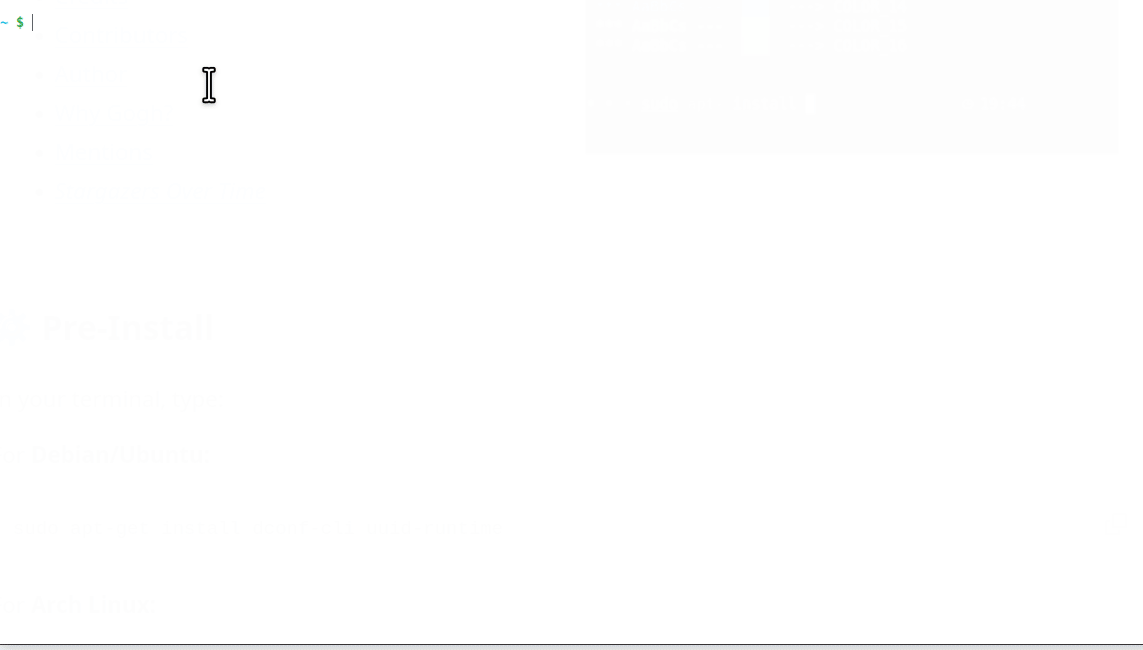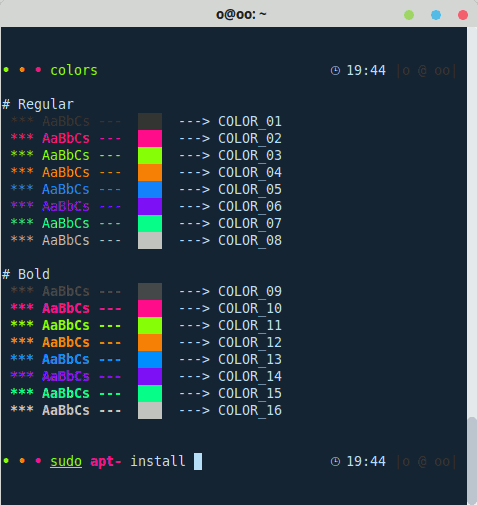 Gogh
Gogh
Gogh is a collection of color schemes for various terminal emulators, including Gnome Terminal, Pantheon Terminal, Tilix, and XFCE4 Terminal also compatible with iTerm on macOS.
Top Related Projects
Node Version Manager - POSIX-compliant bash script to manage multiple active node.js versions
🙃 A delightful community-driven (with 2,400+ contributors) framework for managing your zsh configuration. Includes 300+ optional plugins (rails, git, macOS, hub, docker, homebrew, node, php, python, etc), 140+ themes to spice up your morning, and an auto-update tool that makes it easy to keep up with the latest updates from the community.
A Zsh theme
Fish-like autosuggestions for zsh
Fish shell like syntax highlighting for Zsh.
The user-friendly command line shell.
Quick Overview
Gogh is a color scheme manager for GNOME Terminal and other terminal emulators. It provides a collection of color schemes and a simple script to install them, allowing users to easily customize their terminal's appearance with pre-defined color palettes inspired by popular themes and designs.
Pros
- Large collection of pre-defined color schemes (150+)
- Easy installation process with a single command
- Supports multiple terminal emulators (GNOME Terminal, Pantheon Terminal, Tilix, and more)
- Allows for easy switching between color schemes
Cons
- Limited to terminal emulators; doesn't affect other parts of the system UI
- Some color schemes may not be suitable for all users' preferences or needs
- Requires manual intervention to revert changes or uninstall
- May not work with all terminal emulators or configurations
Getting Started
To install Gogh and apply a color scheme, follow these steps:
- Open your terminal
- Run the following command:
bash -c "$(wget -qO- https://git.io/vQgMr)"
- Choose your terminal emulator from the list
- Select a color scheme from the presented options
- The chosen color scheme will be applied to your terminal
Note: Make sure to back up your terminal settings before running the script, as it may overwrite existing configurations.
Competitor Comparisons
Node Version Manager - POSIX-compliant bash script to manage multiple active node.js versions
Pros of nvm
- Widely adopted and mature tool for managing Node.js versions
- Supports multiple operating systems (Linux, macOS, Windows via WSL)
- Extensive documentation and community support
Cons of nvm
- Limited to Node.js version management only
- Requires manual installation and setup
- Can potentially conflict with system-wide Node.js installations
Code Comparison
nvm:
nvm install 14.17.0
nvm use 14.17.0
nvm alias default 14.17.0
Gogh:
gogh install gruvbox
gogh apply gruvbox
gogh list
Key Differences
- Purpose: nvm focuses on Node.js version management, while Gogh is for terminal color scheme management
- Scope: nvm is specific to Node.js development, Gogh is applicable to various terminal emulators
- Installation: nvm requires manual installation, Gogh offers a one-line installation script
- Usage: nvm uses version numbers for management, Gogh uses color scheme names
- Community: nvm has a larger user base and more frequent updates due to its critical role in Node.js development
Conclusion
While both tools serve different purposes, they share the common goal of enhancing developer productivity. nvm is essential for Node.js developers, providing version management capabilities. Gogh, on the other hand, focuses on improving the visual experience of terminal users across various environments.
🙃 A delightful community-driven (with 2,400+ contributors) framework for managing your zsh configuration. Includes 300+ optional plugins (rails, git, macOS, hub, docker, homebrew, node, php, python, etc), 140+ themes to spice up your morning, and an auto-update tool that makes it easy to keep up with the latest updates from the community.
Pros of Oh My Zsh
- Extensive plugin ecosystem with over 300 built-in plugins
- Active community with frequent updates and contributions
- Comprehensive theming system with numerous pre-configured themes
Cons of Oh My Zsh
- Can potentially slow down shell startup time due to its size and complexity
- Requires Zsh shell, which may not be the default on all systems
- Steeper learning curve for customization compared to simpler color schemes
Code Comparison
Oh My Zsh (theme configuration):
ZSH_THEME="robbyrussell"
plugins=(git docker kubectl)
source $ZSH/oh-my-zsh.sh
Gogh (color scheme installation):
bash -c "$(wget -qO- https://git.io/vQgMr)"
Oh My Zsh focuses on comprehensive shell customization, including plugins, aliases, and themes, while Gogh primarily deals with terminal color schemes. Oh My Zsh requires more configuration but offers broader functionality, whereas Gogh provides a simpler solution for quickly changing terminal colors across various terminal emulators.
A Zsh theme
Pros of powerlevel10k
- Highly customizable and feature-rich Zsh theme
- Fast and efficient, with instant prompt feature
- Extensive documentation and configuration wizard
Cons of powerlevel10k
- Limited to Zsh shell environments
- Steeper learning curve for advanced customizations
- May require additional fonts for full functionality
Code Comparison
powerlevel10k configuration example:
POWERLEVEL9K_LEFT_PROMPT_ELEMENTS=(
dir
vcs
newline
prompt_char
)
POWERLEVEL9K_RIGHT_PROMPT_ELEMENTS=(
status
command_execution_time
background_jobs
)
Gogh color scheme application:
wget -O gogh https://git.io/vQgMr && chmod +x gogh && ./gogh && rm gogh
Summary
powerlevel10k is a powerful Zsh theme with extensive customization options and performance optimizations. It offers a rich set of features for enhancing the command-line experience but is limited to Zsh environments. Gogh, on the other hand, is a collection of color schemes for various terminal emulators, providing a simpler approach to customizing terminal appearance across different platforms and shells. While powerlevel10k focuses on advanced prompt customization, Gogh emphasizes easy application of pre-defined color schemes to improve terminal aesthetics.
Fish-like autosuggestions for zsh
Pros of zsh-autosuggestions
- Enhances shell productivity with real-time command suggestions
- Lightweight and easy to integrate into existing Zsh setups
- Customizable suggestion strategy and appearance
Cons of zsh-autosuggestions
- Limited to Zsh shell, not applicable for other terminal environments
- May slow down terminal performance on older systems or with large history files
- Requires some learning curve to effectively use suggestions
Code Comparison
zsh-autosuggestions:
# Enable zsh-autosuggestions
source ~/.zsh/zsh-autosuggestions/zsh-autosuggestions.zsh
# Customize suggestion strategy
ZSH_AUTOSUGGEST_STRATEGY=(history completion)
Gogh:
# Install Gogh themes
bash -c "$(wget -qO- https://git.io/vQgMr)"
# Set a specific theme
gogh_colors argonaut
Summary
zsh-autosuggestions is a Zsh-specific plugin that enhances command-line productivity by providing real-time suggestions based on command history. It's lightweight and customizable but limited to Zsh users. Gogh, on the other hand, is a collection of color schemes for various terminal emulators, offering a wide range of visual customization options across different platforms. While zsh-autosuggestions focuses on functionality, Gogh emphasizes aesthetics and cross-terminal compatibility.
Fish shell like syntax highlighting for Zsh.
Pros of zsh-syntax-highlighting
- Enhances the command-line experience with real-time syntax highlighting
- Supports a wide range of ZSH features and plugins
- Highly customizable with various highlighting styles and options
Cons of zsh-syntax-highlighting
- Limited to ZSH shell environments, not applicable to other shells
- May slightly impact terminal performance, especially on slower systems
- Requires manual installation and configuration
Code Comparison
zsh-syntax-highlighting:
# Enable syntax highlighting
source /path/to/zsh-syntax-highlighting/zsh-syntax-highlighting.zsh
# Customize highlighting styles
ZSH_HIGHLIGHT_STYLES[alias]='fg=magenta,bold'
ZSH_HIGHLIGHT_STYLES[command]='fg=green,bold'
Gogh:
# Install Gogh themes
bash -c "$(wget -qO- https://git.io/vQgMr)"
# Apply a theme (e.g., Dracula)
gogh_colors dracula
While zsh-syntax-highlighting focuses on enhancing the command-line interface with real-time syntax highlighting for ZSH users, Gogh is a collection of color schemes for various terminal emulators. zsh-syntax-highlighting offers more interactive functionality but is limited to ZSH, whereas Gogh provides a wider range of visual customization options across different terminal environments.
The user-friendly command line shell.
Pros of fish-shell
- More comprehensive shell environment with advanced features like autosuggestions and web-based configuration
- Actively maintained with frequent updates and a large community
- Designed for both beginners and advanced users with extensive documentation
Cons of fish-shell
- Larger project scope, which may be overwhelming for users only interested in terminal theming
- Requires more system resources and setup compared to a simple theme manager
- Less focused on visual customization, as it's a full shell replacement
Code Comparison
fish-shell:
function fish_prompt
set_color $fish_color_cwd
echo -n (prompt_pwd)
set_color normal
echo -n ' > '
end
Gogh:
#!/usr/bin/env bash
echo -e "\e]4;0;#282a2e\a"
echo -e "\e]4;1;#a54242\a"
echo -e "\e]4;2;#8c9440\a"
Summary
While fish-shell offers a complete shell environment with advanced features, Gogh focuses specifically on terminal color schemes. fish-shell provides a more comprehensive solution for users looking to enhance their command-line experience, but Gogh may be preferable for those primarily interested in visual customization without changing their existing shell setup.
Convert  designs to code with AI
designs to code with AI

Introducing Visual Copilot: A new AI model to turn Figma designs to high quality code using your components.
Try Visual CopilotREADME
Gogh

Color Scheme Implementer for Terminals
Gogh is a collection of color schemes for various terminal emulators, including Gnome Terminal, Pantheon Terminal, Tilix, and XFCE4 Terminal. These schemes are designed to make your terminal more visually appealing and improve your productivity by providing a better contrast and color differentiation. (This fork of Gogh includes a color scheme named "Vaombe".)
The inspiration for Gogh came from the clean and minimalistic design of Elementary OS, but the project has since grown to include a variety of unique and beautiful options. Not only does Gogh work on Linux systems, but it's also compatible with iTerm on macOS, providing a consistent and visually appealing experience across platforms.
|
Index: |
|
âï¸ Pre-Install
In your terminal, type:
For Debian/Ubuntu:
sudo apt-get install dconf-cli uuid-runtime
For Arch Linux:
sudo pacman -S dconf util-linux-libs
You can now install Gogh in Interactive Mode (Easier) or Non-Interactive Mode! (Ideal for Scripting)
Install
Interactive Mode:
1. Just copy and paste this one-line command:
bash -c "$(wget -qO- https://git.io/vQgMr)"
Or, if you're a Mac user:
bash -c "$(curl -sLo- https://git.io/vQgMr)"
2. Select your installed theme from your terminal.
DEMO:

âï¸ Install (Non-Interactive Mode)
Two ways:
- Clone the repository.
- Download the only required files. (Bare Minimum!)
Clone Repository
# Clone the repo into "$HOME/src/gogh"
mkdir -p "$HOME/src"
cd "$HOME/src"
git clone https://github.com/Gogh-Co/Gogh.git gogh
cd gogh
# necessary in the Gnome terminal on ubuntu
export TERMINAL=gnome-terminal
# necessary in the Alacritty terminal
pip install -r requirements.txt
export TERMINAL=alacritty
# Enter theme installs dir
cd installs
# install themes
./atom.sh
./dracula.sh
Download the only required files. (Bare Minimum!)
# Download apply script
wget https://github.com/Gogh-Co/Gogh/raw/master/apply-colors.sh
# Download desired themes from ./installs/ like this:
wget https://github.com/Gogh-Co/Gogh/raw/master/installs/selenized-dark.sh
# Optional - download Alacritty dependency (may require additional python packages, see requirements.txt for more)
wget https://github.com/Gogh-Co/Gogh/raw/master/apply-alacritty.py
# Optional - download Terminator dependency (may require additional python packages, see requirements.txt for more)
wget https://github.com/Gogh-Co/Gogh/raw/master/apply-terminator.py
# You can also specify where to find the apply scripts with the following environmental variables:
GOGH_APPLY_SCRIPT=/path/to/apply-colors.sh
GOGH_ALACRITTY_SCRIPT=/path/to/apply-alacritty.py # only needed if applying to Alacritty terminal
GOGH_TERMINATOR_SCRIPT=/path/to/apply-terminator.py # only needed if applying to Terminator terminal
# Control Gogh behavior with the following:
TERMINAL=gnome-terminal # Select for which terminal to install the theme
# (see apply-colors.sh for all supported terminals)
GOGH_NONINTERACTIVE= # Make output silent and answer all prompts with default value
# (errors will still be printed)
GOGH_USE_NEW_THEME= # Make theme the currently used/default one of the terminal
# Actual effect may differ between terminals
# Supported terminals: xfce4-terminal
# Apply downloaded theme (apply script must be in the same folder)
TERMINAL=gnome-terminal bash ./selenized-dark.sh
# OR specify apply script path
GOGH_APPLY_SCRIPT=/path/to/file/apply-colors.sh bash ./selenized-dark.sh
ð» Terminal Support
Here are some terminals that Gogh is supported with:
- Alacritty - Web
- Cygwin - Web
- Foot - Web
- Gnome - Web
- Guake - Web
- iTerm - Web
- Kitty - Web
- Konsole - Web
- Mate - Web
- Mintty - Web
- Pantheon / Elementary - Web
- Tilix - Web
- Wezterm - Web
- XFCE4 - Web
- Terminator - Web
ð¨ Themes
We have lots of themes in stock! Check them out here!
- json: https://raw.githubusercontent.com/Gogh-Co/Gogh/master/data/themes.json
- json min: https://raw.githubusercontent.com/Gogh-Co/Gogh/master/data/themes-min.json
ð WCAG - Accessibility Contrast
- wcag: https://raw.githubusercontent.com/Gogh-Co/Gogh/master/data/wcag.json
- wcag min: https://raw.githubusercontent.com/Gogh-Co/Gogh/master/data/wcag-min.json
- More information: https://webaim.org/resources/contrastchecker/
â HELP
- Ubuntu 19.10: default_profile not a valid identifier, command not found
- Using Elementary terminal but says unsupported
- Doesn't working Debian
- Not Working on Ubuntu
sudo apt install gconf2- https://github.com/Gogh-Co/Gogh/issues/334#issuecomment-1374541799
ð¹ Debian Fixes
Fix 1 (@romzie):
- Reset your profiles:
dconf reset -f /org/gnome/terminal/legacy/profiles:/
Fix 2 (@MalwareJedi):
- Reset your profiles:
dconf reset -f /org/gnome/terminal/legacy/profiles:/
- Close your terminal; re-open it.
- Go to Edit ---> Preferences ---> Profiles.
- Create a new profile called Default.
- Close the terminal. re-open it.
- Confirm that Default is still listed in your profiles.
- If it is, run the Gogh script again.
Fix 3 (@sui74):
- Reset your profiles:
dconf reset -f /org/gnome/terminal/legacy/profiles:/
- "Unname" Rename profile called "default".
sudo apt install uuid-runtime
- Run the Gogh script.
ð¹ Elementary OS
1 - Uncomment the following line in .bashrc ;you can find this file in your /home/USER/ directory.
#force_color_prompt=yes
2 - Execute in terminal
source .bashrc
ð¼ï¸ Create your Own Theme!
Good news! Now, creating themes are easier than ever.
All you need to do is to create a YAML format file, following the example of the other files in the themes folder.
Some rules to keep in mind:
- The file name should match the name of the theme. For example:
- Filename:
Solarized Dark.yml - Inside the .yml file:
name: 'Solarized Dark'
- Filename:
- Use title case for all words by capitalizing their first letter.
- Ensure that the contrast is sufficient for good legibility.
Now, you can send your Pull Request Thank you for collaborating!
Theme ".yml" template
If you indeed use this, replace the HEX values with your own ones.
---
name: 'Gogh'
author: '' # 'Author Name (http://website.com)'
variant: '' # Dark or Light
color_01: '#292D3E' # Black (Host)
color_02: '#F07178' # Red (Syntax string)
color_03: '#62DE84' # Green (Command)
color_04: '#FFCB6B' # Yellow (Command second)
color_05: '#75A1FF' # Blue (Path)
color_06: '#F580FF' # Magenta (Syntax var)
color_07: '#60BAEC' # Cyan (Prompt)
color_08: '#ABB2BF' # White
color_09: '#959DCB' # Bright Black
color_10: '#F07178' # Bright Red (Command error)
color_11: '#C3E88D' # Bright Green (Exec)
color_12: '#FF5572' # Bright Yellow
color_13: '#82AAFF' # Bright Blue (Folder)
color_14: '#FFCB6B' # Bright Magenta
color_15: '#676E95' # Bright Cyan
color_16: '#FFFEFE' # Bright White
background: '#292D3E' # Background
foreground: '#BFC7D5' # Foreground (Text)
cursor: '#BFC7D5' # Cursor
Explanation of colors and variables
The colors of the terminal are composed of 18 colors in 3 sections.
Section 1: Regular text.
Section 2: Bold text.
Section 3: text and background.
The basic colors are 8:
- Black
- Red
- Green
- Yellow
- Blue
- Purple
- Cyan
- White
In comments variables is that of the console belongs each color.
Here is a picture that explains a little better as colors are distributed.

ð¨âð» As command line
WARNING: Only if you know what you are doing or trust me :)
sudo wget -O /usr/local/bin/gogh https://git.io/vQgMr && sudo chmod +x /usr/local/bin/gogh
Now in your terminal just type gogh:
gogh
ð± First commit:
Nov 18, 2013 - aa9871e
:heart: Credits:
- 4bit
- Bluloco Light Theme
- Catppuccin
- Chalk by Sindre Sorhus
- Dracula by Zeno Rocha
- Elementary OS
- Everblush
- Everforest Dark & Light theme set by Sainnhe Park
- Fairy Floss
- Flat Remix
- Flat UI Terminal Theme
- Gooey by Matt Harris
- Gotham by Andrea Leopardi
- Gruvbox by Pavel Pertsev
- Hemisu by Noah Frederick
- kokuban by ygkn
- Monokai by Wimer Hazenberg
- Nightfox
- Ocean by Fabian Perez
- Omni
- One Dark & Light theme set by Nathan Buchar
- Panda by Siamak
- Peppermint by Noah Frederick
- Rosé Pine
- Selenized
- SMYCK by John-Paul Bader
- Snazzy by Sindre Sorhus
- Solarized by Ethan Schoonover
- Sonokai by Sainnhe Park
- Srcery by Daniel Berg
- Summer Pop by Guillermo Aguirre
- SynthWave '84
- SynthWave Alpha
- Terminal Sexy by George Czabania
- Tilix
- Tokyo Night
- Tomorrow color theme set by Chris Kempson
- Material theme by Mitchel van Eijgen and Liu Xinan
- KANAGAWA.nvim
- Apprentice
- Oxocarbon
- website-theme
:heart: Contributors:
Many thanks to all who have participated in this project.
ð§ Author (contributor)
I cannot claim to be the only author of this project. Without the help of the people who have contributed, this would not have been possible. Therefore, that's why all contributors are listed first in this document. While I am listed as the author, the true authors are all those who are mentioned in the document. I would like to express my gratitude to all of them, as well as to future contributors.
- Miguel D. Quintero - Lanet.co
ðµ Invite me a coffee - paypal
ðï¸ Why Gogh?
There is no blue without yellow and without orange.
-- Vincent Van Gogh --
ð£ Mentions
ð Stargazers Over Time
Top Related Projects
Node Version Manager - POSIX-compliant bash script to manage multiple active node.js versions
🙃 A delightful community-driven (with 2,400+ contributors) framework for managing your zsh configuration. Includes 300+ optional plugins (rails, git, macOS, hub, docker, homebrew, node, php, python, etc), 140+ themes to spice up your morning, and an auto-update tool that makes it easy to keep up with the latest updates from the community.
A Zsh theme
Fish-like autosuggestions for zsh
Fish shell like syntax highlighting for Zsh.
The user-friendly command line shell.
Convert  designs to code with AI
designs to code with AI

Introducing Visual Copilot: A new AI model to turn Figma designs to high quality code using your components.
Try Visual Copilot